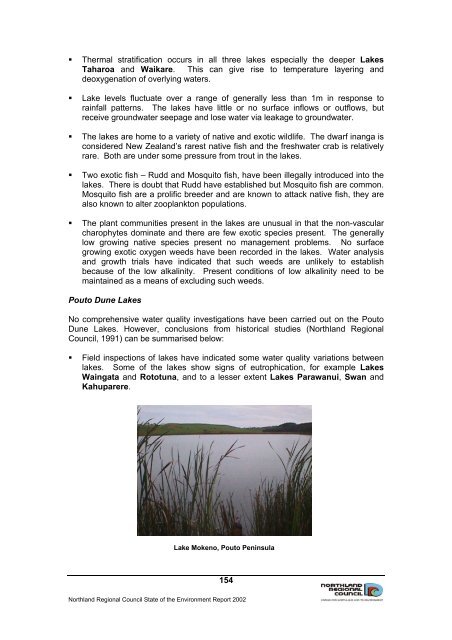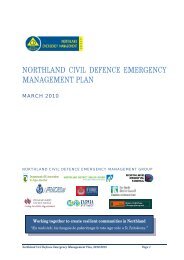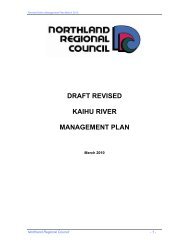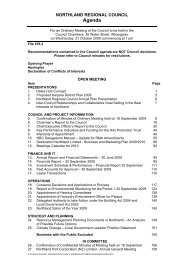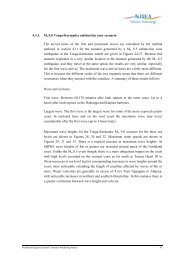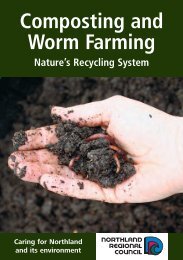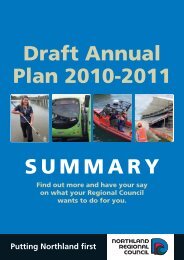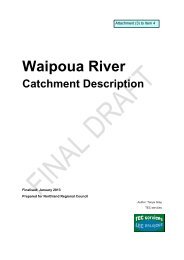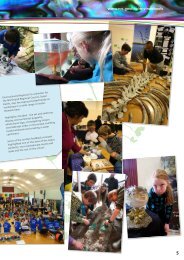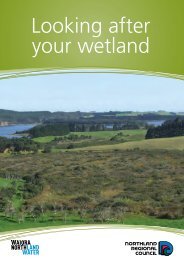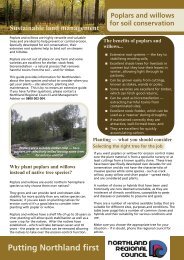The State of the Lakes of Northland - Northland Regional Council
The State of the Lakes of Northland - Northland Regional Council
The State of the Lakes of Northland - Northland Regional Council
Create successful ePaper yourself
Turn your PDF publications into a flip-book with our unique Google optimized e-Paper software.
• <strong>The</strong>rmal stratification occurs in all three lakes especially <strong>the</strong> deeper <strong>Lakes</strong>Taharoa and Waikare. This can give rise to temperature layering anddeoxygenation <strong>of</strong> overlying waters.• Lake levels fluctuate over a range <strong>of</strong> generally less than 1m in response torainfall patterns. <strong>The</strong> lakes have little or no surface inflows or outflows, butreceive groundwater seepage and lose water via leakage to groundwater.• <strong>The</strong> lakes are home to a variety <strong>of</strong> native and exotic wildlife. <strong>The</strong> dwarf inanga isconsidered New Zealand’s rarest native fish and <strong>the</strong> freshwater crab is relativelyrare. Both are under some pressure from trout in <strong>the</strong> lakes.• Two exotic fish – Rudd and Mosquito fish, have been illegally introduced into <strong>the</strong>lakes. <strong>The</strong>re is doubt that Rudd have established but Mosquito fish are common.Mosquito fish are a prolific breeder and are known to attack native fish, <strong>the</strong>y arealso known to alter zooplankton populations.• <strong>The</strong> plant communities present in <strong>the</strong> lakes are unusual in that <strong>the</strong> non-vascularcharophytes dominate and <strong>the</strong>re are few exotic species present. <strong>The</strong> generallylow growing native species present no management problems. No surfacegrowing exotic oxygen weeds have been recorded in <strong>the</strong> lakes. Water analysisand growth trials have indicated that such weeds are unlikely to establishbecause <strong>of</strong> <strong>the</strong> low alkalinity. Present conditions <strong>of</strong> low alkalinity need to bemaintained as a means <strong>of</strong> excluding such weeds.Pouto Dune <strong>Lakes</strong>No comprehensive water quality investigations have been carried out on <strong>the</strong> PoutoDune <strong>Lakes</strong>. However, conclusions from historical studies (<strong>Northland</strong> <strong>Regional</strong><strong>Council</strong>, 1991) can be summarised below:• Field inspections <strong>of</strong> lakes have indicated some water quality variations betweenlakes. Some <strong>of</strong> <strong>the</strong> lakes show signs <strong>of</strong> eutrophication, for example <strong>Lakes</strong>Waingata and Rototuna, and to a lesser extent <strong>Lakes</strong> Parawanui, Swan andKahuparere.Lake Mokeno, Pouto Peninsula154<strong>Northland</strong> <strong>Regional</strong> <strong>Council</strong> <strong>State</strong> <strong>of</strong> <strong>the</strong> Environment Report 2002


